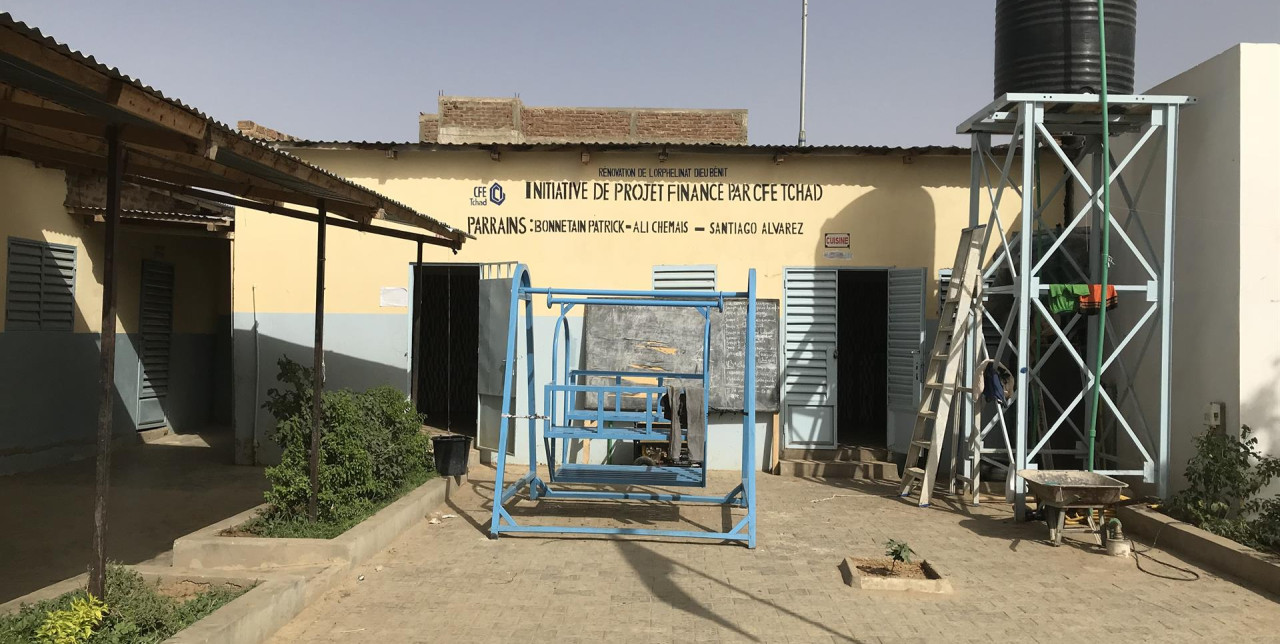20-07-2018 | di COOPI
Chad: inside N'Djamena orphanage
(Source: vita.it, in Italian)
The Orphelinat Dieu Bénit, one of the ten child care centres managed in Chad by the ‘Union des Associations pour la Protection de l'Enfance au Tchad’ (UAPET) network, is located at the end of a dirt road, away from N'Djamena’s noisy traffic and car horns. It was developed thanks to the support of Coopi and the European Union, with the aim of bringing together various organizations involved in the care and protection of minors.
The "Dieu Bénit" centre is called " orphanage", yet upon entering the inner courtyard, beyond the heavy iron doors that separate it from the street, the atmosphere is quite different from the bleak greyness that the word "orphanage" evokes.
Several children, of all ages, play on the ground, some do their homework in the library, others sleep in the bunk beds of their rooms; the doors leading to the courtyard are open.
«Dieu Bénit, like the other reception centres, originates from local initiatives as a response to the abandoned minors and to offer support to families who cannot take care of their children for various reasons», explains Elsa Mbebangu, psychologist and coordinator of the project for Coopi. The institute was founded in 2011 by one of N'Djamena’s citizens, Nadjimbaidjé Séphora, age 57, who was also an orphan of a very young father and was therefore quite eager to help those who were in a situation similar to hers. In addition to the operators, a group of local volunteers also helped out to ensure Dieu Bénit’s success.
«As part of the project, we set up psychosocial support training so as to provide the people involved in the institutions with the tools needed to manage the most sensitive cases». At the moment there are 55 minors in the orphanage, along with 20 youngsters who, within the project, are taking part in a path towards family reintegration.
«In addition to psychological training and support, we also provided school kits and launched professional start-up initiatives». There is also a schoolroom inside the facilities, right next to the rooms. Several of the children still have a family, but they agreed to send them to Dieu Bénit in order to help them study and offer them an extra opportunity. «This was once a much more widespread practice», says Mbebangu, recounting that it is much more difficult to make this choice today for families, even for the most needy. A deep fracture took place in 2007 after the Zoe's Ark charity scandal, where 103 children were taken away from their families with the non-profit organization’s promise to send them to school. The youngsters were instead taken to France as refugees from Darfur, to be given up for adoption to French families. A collective trauma, that left its mark on an entire generation of Chadian parents. «Families are afraid of not seeing their children again if they allow them to move away to attend school. Even the women in prison do not want to let their children go», continues Mbebangu. «Many are frightened and, as a result, numerous young children cannot have access to schools».
The Zoe's Ark scandal has also provoked rigorous restraints on international adoptions, making Chad a country where adopting is extremely difficult. The highest probability of finding a family, for orphans who do not have relatives that can take care of them, is to be adopted by Chadian citizens.
Freshly painted, the yellow walls stand out against the city’s blue sky.
«Children and youngsters have varying problems. First of all, the trauma of separation from their parents, which is often repeated during adolescence, as their identity is being defined», explains the coordinator, while emphasizing that often children arriving at the orphanage leave behind stories of violence and other traumatic events. «There are those who are victims of abuse, and those who have been subjected to forced marriage, even though this practice is now illegal».
It is precisely the serious issue of early and forced marriages that still represents one of the most important battles to be carried out for children's rights in Chad.
«The minors’ situation in this country is still very complicated. There are various serious problems, often linked to the fragile and poor conditions of families. They include sexual exploitation, high child labour rates rate and recruitment of children in armed groups», concludes Mbebangu. «Some important steps forward have been made. But we mustn’t stop. The country’s future is at stake».
A part of Africa and part of the world.
- Ottavia Spaggiari




 Chad
Chad